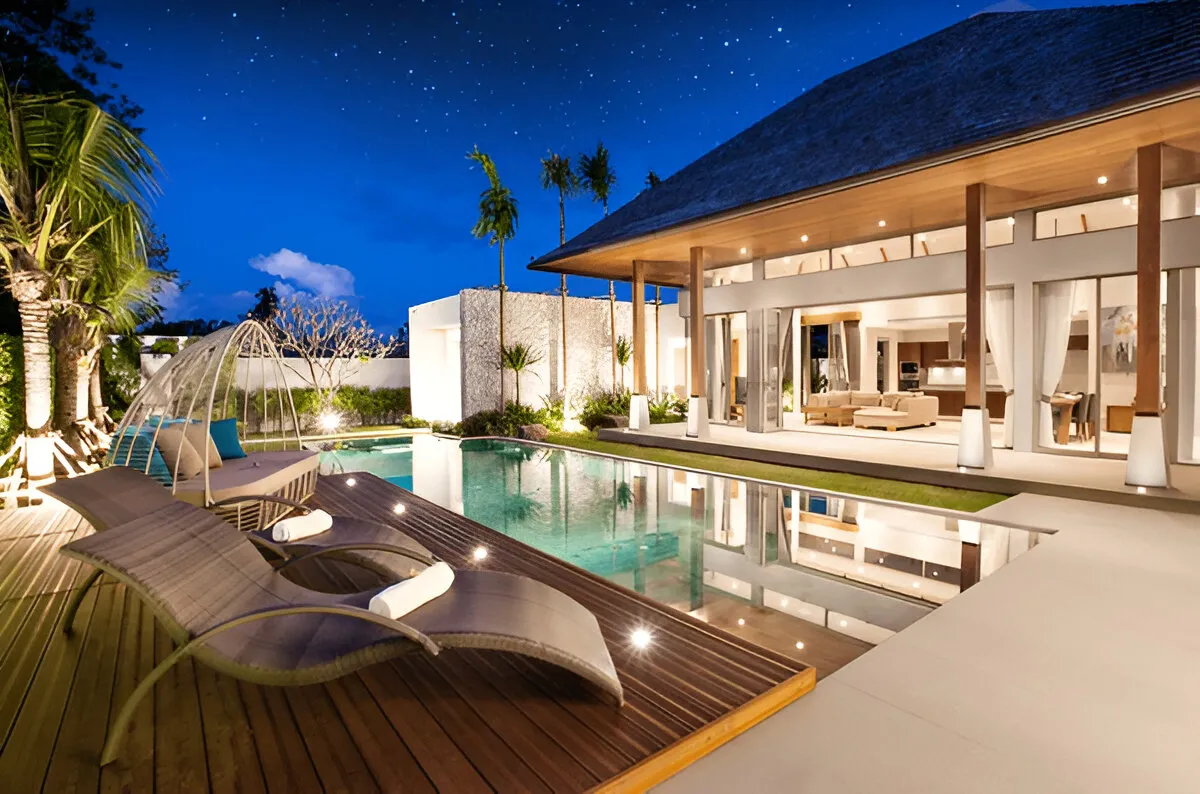- Key Takeaways
- What Defines Luxury Real Estate?
- Global Demand for Luxurious Properties
- Sustainability and Eco-friendly Designs
- Integration of Smart Home Technology
- Strategic Investment in Luxury Real Estate
- Market Dynamics: Understanding Real Estate Trends
- Expert Tips for Buying or Selling Luxury Homes
- Future Outlook: What Lies Ahead for Luxury Properties
Key Takeaways
- Unique features, prime locations, and high demand globally define luxury real estate.
- Current trends include sustainable architecture and smart home technology.
- Investment in luxury properties can offer substantial returns with the right strategies.
- Understanding market dynamics is crucial for buyers and sellers in the luxury sector.
What Defines Luxury Real Estate?
Luxury real estate stands as a pinnacle of the housing market, characterized by its luxury, exceptional design, and, often, its historical significance or architectural sophistication. These properties are found strategically, from bustling city centers to serene waterfronts, offering their owners prestige and privacy. Unique architectural features like grand foyers, expansive terraces, and cutting-edge interior designs cater to those seeking an unparalleled living experience.
Global Demand for Luxurious Properties
The demand for luxury real estate is a global phenomenon, transcending borders and driven by various factors, including economic growth, increased connectivity, and a desire for stability. Metropolises like New York, London, and Hong Kong consistently attract affluent individuals and investors eager to park their wealth in high-value assets. In a market where perception is as important as reality, a 30A real estate agent Richard Jabbour, with extensive knowledge and insight, can be pivotal in discerning the finer nuances that define true luxury. These cities offer basic amenities, a vibrant cultural scene, and economic opportunities. According to insights from Cigar Aficionado, the combination of cultural significance and economic prospects makes these cities irresistible to the elite, further fueling property demand and price appreciation.
Sustainability and Eco-friendly Designs
Sustainability has become a core element of luxury real estate, reshaping architectural trends and consumer expectations. Eco-friendly homes are constructed with materials that reduce environmental impact, featuring innovations such as green roofs, solar panels, and cutting-edge water management systems. These design choices appeal to environmentally conscious buyers and are becoming increasingly important as climate change influences daily life. Furthermore, homes built with sustainability in mind tend to have a higher market value due to their ability to lower utility costs and enhance living comfort. The push towards green building practices represents a broader alignment with global environmental goals and real estate’s commitment to sustainable growth.
Integration of Smart Home Technology
The digital revolution has significantly imprinted luxury real estate, mainly through integrating smart home technology. From intelligent security systems that provide peace of mind to automated climate controls enhancing comfort, these features are becoming standard in high-end residences. Such advancements cater to tech-savvy buyers who view innovative technology as a convenience and an essential component of modern living. This integration also plays into future-proofing properties, ensuring they retain their appeal and value as technology evolves. Adopting these technologies illustrates the seamless blend of luxury with innovation, offering residents a sophisticated lifestyle aligned with the latest technological trends.
Strategic Investment in Luxury Real Estate
Investing in luxury real estate requires a blend of strategic insight and market awareness. It’s a sector that promises significant returns, particularly in regions where demand outpaces supply. Savvy investors often look to properties in emerging markets or luxury vacation spots, recognizing these areas as hotspots for future growth. Diversification in geographic locations and property types is crucial in minimizing risks and capitalizing on potential gains. As Forbes highlights, understanding the subtleties of different markets and aligning investments with growth trajectories can temper some of the unpredictabilities inherent in real estate investments. This strategic approach ensures that investors can maximize returns while mitigating potential downsides.
Market Dynamics: Understanding Real Estate Trends
Many dynamic factors, including economic fluctuations, geopolitical events, and evolving consumer preferences, shape the luxury real estate market. Timing and keen market awareness are essential, as external influences can rapidly shift demand and values. Those who succeed in this space often remain agile and adapt their strategies to align with prevailing trends. Keeping abreast of these changes and consulting with market experts enables stakeholders to make informed decisions about buying, selling, or holding properties, and understanding these dynamics as the global landscape shifts becomes increasingly pivotal to success in the luxury real estate sector.
Expert Tips for Buying or Selling Luxury Homes
Buying or selling luxury homes is intricate and demands expertise and precision. Engaging with seasoned professionals with in-depth market knowledge and extensive networks can significantly smooth the transaction process. Buyers are encouraged to delve deeply into research, understanding not just the property but the surrounding market and lifestyle it offers. On the other hand, sellers must effectively highlight their property’s unique features and value proposition to attract the right buyers. In a market as specific and nuanced as luxury real estate, these expert tips can facilitate successful transactions that meet financial and lifestyle aspirations.
Also Read: Site To Do Business: Find Best Locations Here Today 2024!
Future Outlook: What Lies Ahead for Luxury Properties
The luxury real estate market appears poised for continued growth and evolution. Innovations in construction and design, coupled with shifting demographic trends, are set to drive demand further. As younger, more tech-focused generations acquire wealth, their preferences will likely influence emerging trends, emphasizing sustainability, technology, and experiential living. By staying attuned to these developments and maintaining flexibility in approach, stakeholders in the luxury real estate market can anticipate changes and align their strategies accordingly. This forward-thinking mindset will be crucial in navigating future challenges and capitalizing on opportunities in this ever-evolving sector.

